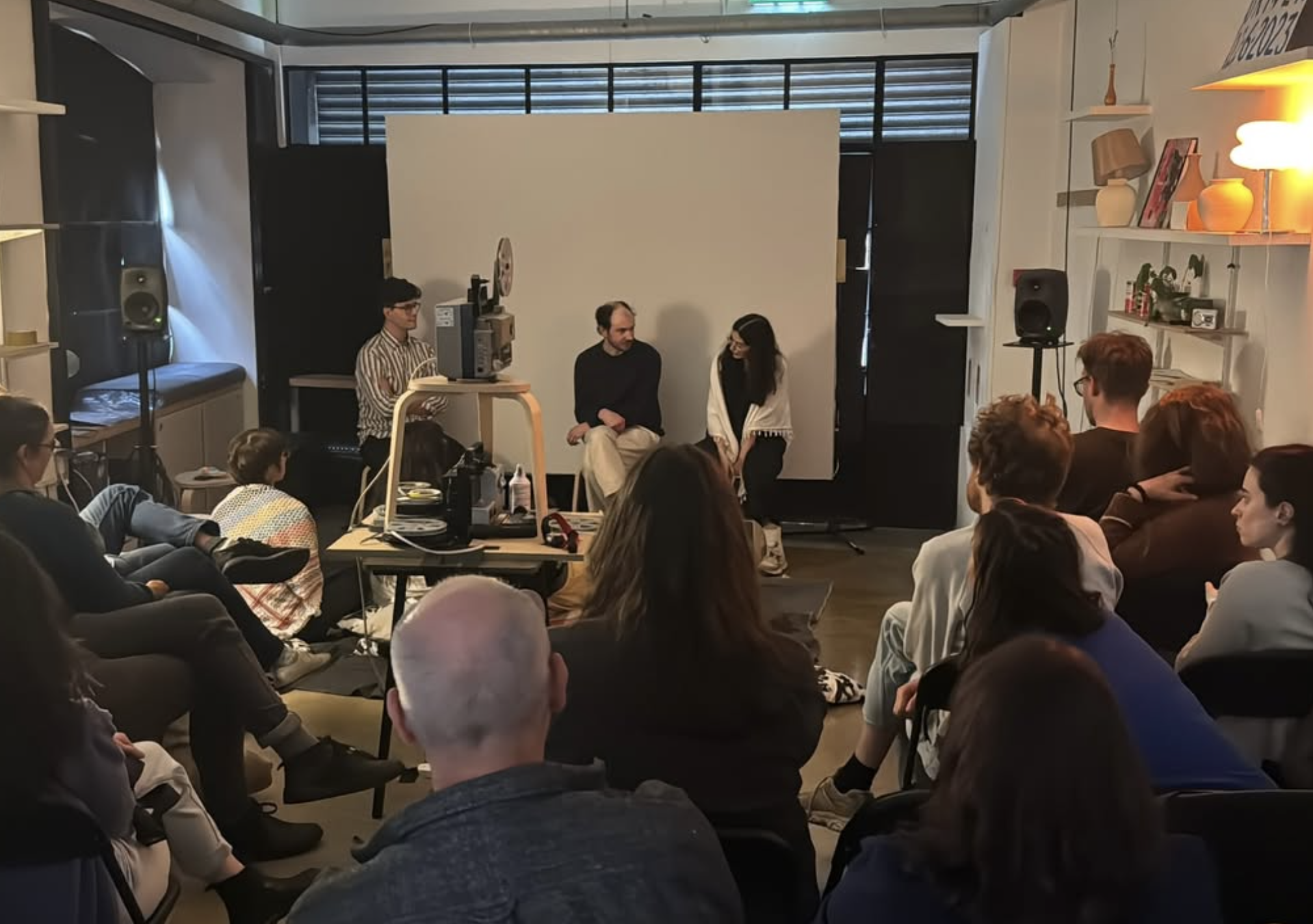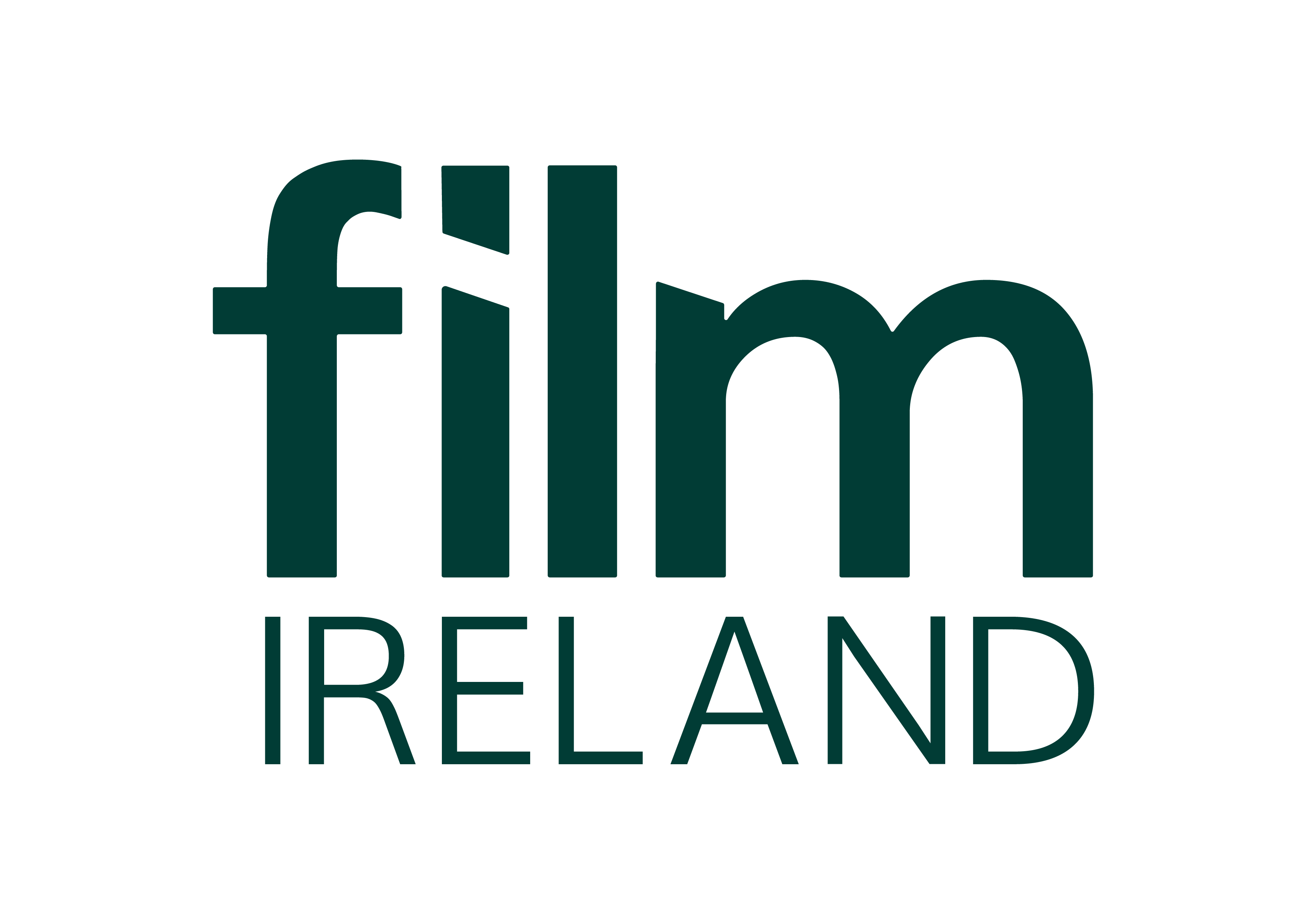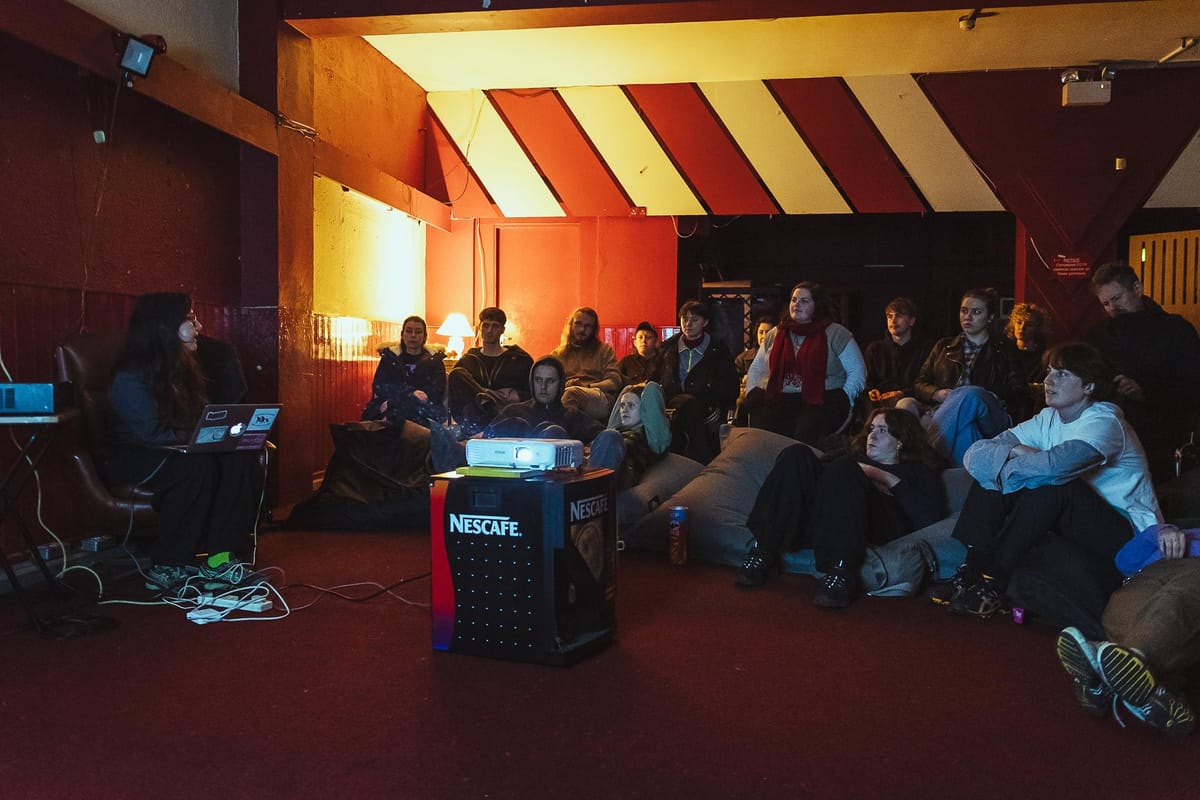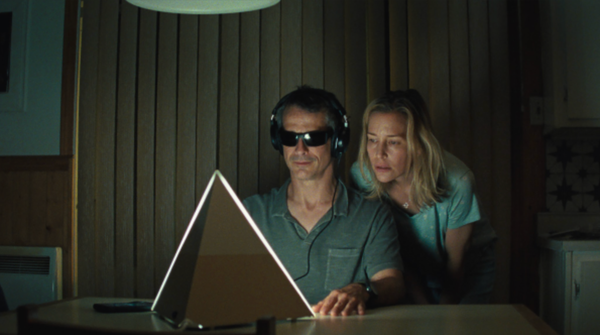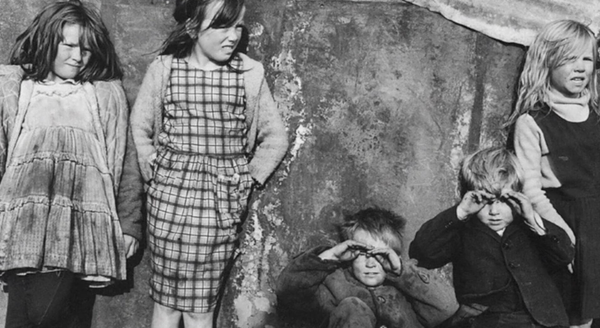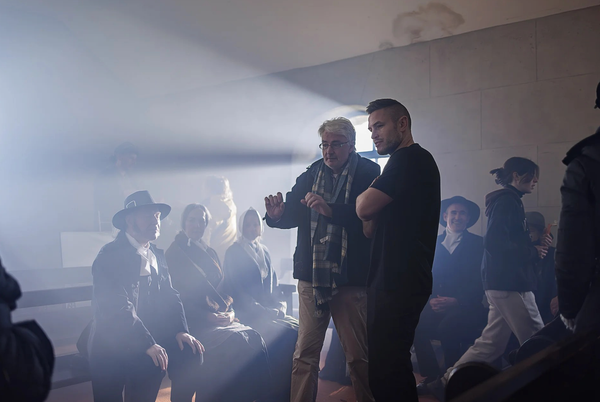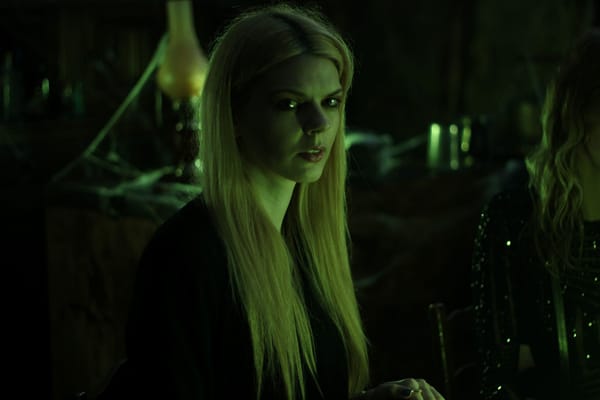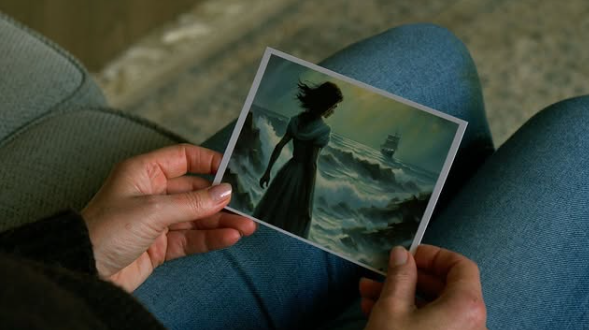Contributor and filmmaker Dev Murray shares her perspective on a emerging collective celebrating indie filmmaking in the capital.
In 2022, fanvid Dublin put a call-out for submissions of short films and visual pieces to screen in Unit 44 on Prussia Street. My submission, a compilation of scenes from the area I live in titled A Noise, a Sound, shot on camcorder, was selected for screening in their line-up – a first for me at the time. Sitting in the packed room with close friends and many strangers watching my footage was thrilling. As was the applause that came after.
The other projects in the programme were varied. Some were similar to mine – experimental, immersive – while others were fully scripted shorts, spanning a mix of genres.
This was where I became part of this grassroots community celebrating all things film. Everything is welcome and the crowd are nothing short of supportive. This is very much a volunteer-run event. It was through offering to help out that I met Alice Quinn Banville, one of fanvid's co-ordinators.
Over the last three years, my videos have screened at many fanvid events, alongside A Noise, a Sound. Every artist will go through a point in the beginning of their career where they’ll produce a piece and then go: “What now?” Well, rest assured, this is the space for you. Fanvid is so accessible, encouraging and passionate about films. Consider this to be your invitation to learn more, or even get involved. Alice and I chatted about the ins and outs of the DIY film club and their next screening, which is happening on Saturday 27th September as part of Aemi’s Dissolutions (of which Alice is the festival manager) in The Complex, Dublin.
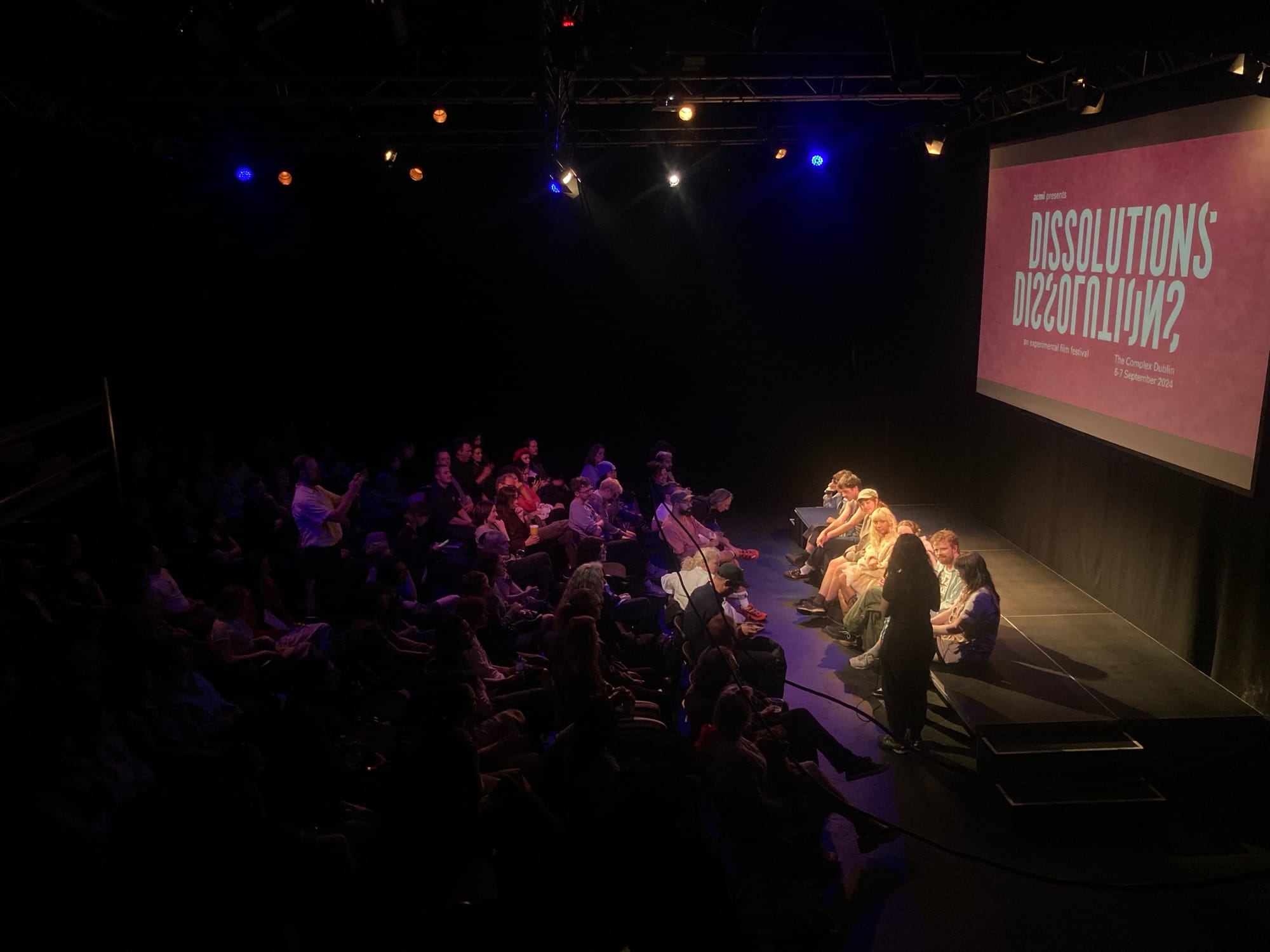
Give me the fanvid origin story. How did it all begin?
Alice: In 2022, some friends had the idea to put together a film club where anyone could show their work. Frank Sweeney, Michelle Doyle and Anthony O'Connor are all independent artists working with film. A first meeting was called to get a lay of the land and answer some questions (what other clubs exist or have existed, what resources are out there for film artists, what do film artists need from a film club?). A lot of people showed up and even more came to the first few screenings. I don’t make films but was interested from the beginning in organising something collectively, and I wanted to experiment with putting programmes together. Initially it started with curated events and then we got going with open calls.
We received a steady stream of submissions from dozens of people in the first few months, not just filmmakers and visual artists but everyone, using their phones to make work or else editing together existing footage online – mainstream films, TikToks, whatever. It was really exciting from the get-go.
What’s the connection between fanvid and Kirkos Ensemble, and how did Unit 44 become the utilised space?
Alice: Kirkos Ensemble operated Unit 44 on Prussia Street for a few amazing years, and now they have relocated to Little Green Street. The film club originally started out at Unit 4 on Foley Street, hosted by electronic music collective Dublin Modular, who were there for a few months as part of DCC’s Incubation Space Award. Once their residency ended, we agreed with Paul Scully and Sebastian Adams of Kirkos that Unit 44 would be the perfect home for fanvid.
We were able to use the space and all the equipment there for free (which is essential because fanvid is entirely run by volunteers, we don’t have any funding and we don’t charge in) thanks to Kirkos’ model, which uses Arts Council funding to cover costs and keep things as accessible as possible for artists. Now we’re still running fanvid from their new space, which is brilliant. Paul and Sebastian hand-made a big projection screen and blackout curtains for the windows. It’s very cosy.
How much has the fanvid community grown since it began?
Alice: It’s grown a lot and is always changing. It’s open to everyone, one of the only rules being that to get your work shown, you have to come along to the screening. So you’re sharing work with your peers, making friends and potential collaborators. It’s a really simple model that can work anywhere. I’d encourage anyone living in other parts of Ireland to start their own.
How do you get the word out?
Alice: We use Instagram to advertise our events and we have a big group chat where we put forward ideas for future screenings and keep the community in the loop. If anyone out there wants to make a snazzy website or a newsletter, be our guest.
How did the collaboration with Aemi for Dissolutions come about?
Alice: Alice Butler, Daniel Fitzpatrick and Anne Hendrick at Aemi have always been really supportive of fanvid. They came to early screenings, contributed ideas and continuously spread the word, encouraging artists to submit their work and connecting us to a lot of new people.
Aemi started Dissolutions in 2024 and invited me to manage the festival and to curate a programme of work submitted to fanvid through the years. It’s an experimental film festival, so a natural home for fanvid, and it offered an exciting opportunity for more people than usual to see the work. This is our second year of the festival and I’m delighted to be showing more films from the fanvid universe.
The programme is called Making Do and features work by Mícheál Keating, Daniel Montague O’Brien, Laura Fitzgerald, Cóilín O’Connell, Michelle Malone, Senan Rogers, Paul O’Neill, Tess Nye, Holly Pickering, Juno Claffey Hegarty and Alannah Davey.
What other organisations have collaborated with fanvid in the past?
Alice: We are completely open to anyone interested in curating an event, so people come to the group chat or our inbox with ideas and then basically take over the organising, with support from other volunteers. Local artists including Cóilín O’Connell, Megan Conery and Ruby Fitzgerald have all curated programmes, while the organisers behind film journal and virtual cinémathèque Ultra Dogme recently presented Small Joys: An Evening of Super 8 Films, featuring work and a talk by artists James Devine, Blanca García and Maximilien Luc Proctor.
Dublin-based group Palestinian Cultural Days also organised a screening of two films by Palestinian filmmaker Abdallah Motan, which included a Q&A with researcher Omar Hmidat to discuss administrative detention, to which Motan was sent without trial or charge by the Israeli authorities.
In November last year, we were invited by Ailbhe W. Drohan and Teresa Collins to Starling in Limerick, where we hosted a filmmaking workshop on the Wednesday and screened the resulting films on the Friday. We used the old cinema space right across the street from Starling (Cinema Café) and since then, local filmmaker Graham Patterson has started Test Screen, an alternative screening series, in the same space.
In early 2025, fanvid returned to DCC’s Unit 4, joining Aemi for a three-month shared residency where we held a series of events and discussed ideas for the future of both groups.
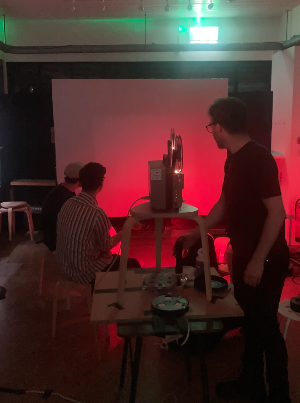
What is the goal?
Alice: The main goal is to give people an opportunity to show work on a regular basis, meet each other and share ideas. Another goal is to stretch the definition of cinema by showing all kinds of moving image without any strict rules. It’s also really important to have independent, collectively run art projects in a city like Dublin.
The club is kept going by everyone who cares about it, with ongoing support from a core group of volunteers: Rachel Enright Murphy, James Moran, Joseph Ryan Warner, Temmuz Süreyya Gürbüz and Frank Sweeney. Together we manage open calls, answer proposals that come into our inbox and produce screening events with the help of Paul and Sebastian at Kirkos.
Are you looking to expand? To what extent could it grow?
Alice: I can’t speak for everyone else involved in fanvid. I know Temmuz is planning to start a fanvid reading group soon, and maybe others will want to develop shared resources for making films or collaborate with other groups in Ireland and abroad.
Personally, I think we’d really benefit from having more independent spaces dedicated to film in Ireland. A microcinema in Dublin would be transformative for the community of artists, curators, critics and filmgoers living here. A model similar to Close-Up in London or Light Industry in New York would work well.
Collectively organised, member-led and artist-led projects like Dublin Digital Radio, Daylight and Kirkos demonstrate their own need and value by the hundreds of people keeping them going. More cultural infrastructure that offers people agency and an opportunity to work together is desperately needed and, either way, fanvid is already a part of that.
The achievements and expansion of fanvid have been immense, despite the lack of funding. Nevertheless, it goes to show what you can do with hands on deck and a community willing to give time and passion to what they love. Whether you’re a filmmaker, someone in the industry or just a film lover, make sure you get involved.
Follow fanvid on Instagram @fanvid_dublin to keep up-to-date with events and news, and subscribe to our YouTube, where you can find an archive of past submissions available to watch.
Dissolutions '25 is an experimental film festival taking place at The Complex this Friday 26th – Sunday 28th September. fanvid: Making Do is at 12pm on Saturday. Tickets and more info available here.
